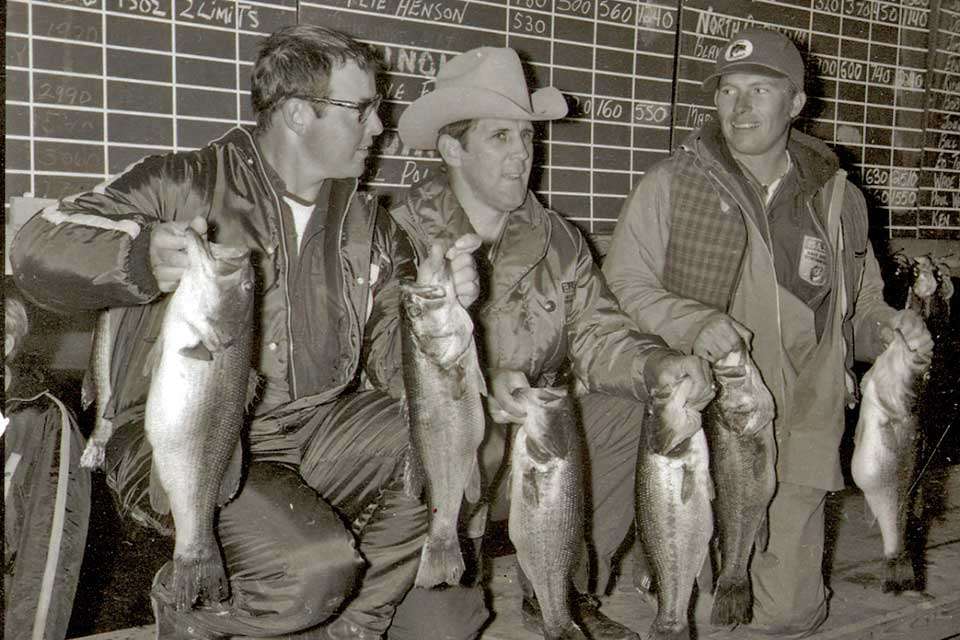
B.A.S.S. would not have gotten off the ground or gone as far as it did without Ray Scott, who a number of veteran anglers say was absolutely the right man at the right time.
To get the sport up and running, Scott employed his many talents – he was part salesman, part carnival barker and full-time bass fishing enthusiast – to sell the sport to the masses.
The organization Scott founded, the Bass Anglers Sportsman Society that’s better known by the acronym B.A.S.S., is celebrating its 50th anniversary this year. It drew national attention almost immediately. In 1969, a year after Scott began signing up anglers to memberships and holding regular tournaments, Sports Illustrated’s Robert Boyle wrote the following passage in an article.
“When it comes to black bass, Ray Scott of Montgomery, Ala., has a silver tongue and a golden touch … and when he talks about bass … he comes on like a revival preacher painting the glories of paradise gained.”
Boyle would go on to fully memorialize Scott’s efforts and vision that helped create the multi-billion dollar bass fishing industry in his 1999 book, Bass Boss. Many others have trumpeted the merits of Scott, who was the early face of the sport as the emcee and kept pushing it forward.
“Ray Scott was a generation ahead of the rest of the country, as far as what would happen,” said Roland Martin, one of the early fishing stars. “I think B.A.S.S. would have finally gotten there, but we would have been 10 or 15 years behind the eight ball. Ray Scott pushed the envelope farther than anybody else.”
With a degree in marketing and sales from Auburn University, Scott acted on his “brainstorm in a rainstorm,” his well-documented epiphany that bass fishing competitions could go national. (Read about Scott’s bio on his website.) His efforts were bolstered by his booming voice and authoritative presence. Scott could and would take over interactions with most anybody.

“Ray Scott was a very aggressive individual, a great promoter,” Bass Fishing Hall of Famer Denny Brauer said. “He could certainly deal with people – could get by with things nobody else could. Very flamboyant. Super guy. Great friend. I love Ray to death.
“He did so much for so many of us by creating the platform where we could make a great living. It really created a great industry. Look what bass fishing has turned into.”
It is rather amazing to compare the gear in the black and white photos from the early days of B.A.S.S. to today’s equipment. Everything from boats — now sleek and speedy fishing platforms loaded with all sorts of gadgets — to rods, reels, line and gear have advanced via the latest technology.
Statistics on fishing expenditures are compiled annually, and numbers from 2016 detail how anglers generated some $48 billion in retail sales with a total impact on the economy of around $115 billion. Scott might not have predicted how large the industry has become.
“You just never, ever dreamed that it was going to evolve into what it has evolved to,” Brauer said. “To see bass fishing grow the way it has, it’s just an amazing 37 years for me.”
When Brauer left behind laying brick in Nebraska for the competitive bass trails, he said it was not something many thought of as a full-fledged career. Even though there were naysayers, he never regretted taking the plunge.
“When I decided to make the move, my mother thought I really needed to be locked up. She thought I totally lost my mind,” he said. “When you look back into the earlier 80s when I did start, it was really a pipe dream to think you could financially become successful bass fishing. If it was a plan I took to a banker, he would have kicked me out the door.
“But it worked out. To think I could have been that successful doing anything else – I don’t think so. I think bass fishing gave me the path, not only financially, but to have a career where I was totally enjoying myself. What more could I ask for?”
Scott help provide the venue for thousands of anglers to live out their dreams, with thousands more embarking each year. And every year, the sport is celebrated in another Scott brainchild, the Bassmaster Classic. It’s a huge championship/expo that brings most everyone in the industry together. It’s been said an angler can parlay a Classic title into at least $1 million in endorsements and engagements, and usually much more. Winning a Classic does make a career.

Hank Parker, the longtime TV outdoors show host, is one of the six anglers who have won more than one Classic. His first of two titles came in 1979 at the end of the sport’s first decade. Fishing not only afforded him a great livelihood, but he lived out a dream.
“I think I lived my life in the best era of the Unites States of America, but I think I lived my life in the best era of B.A.S.S. – those formative years and watching that sport grow,” Parker said. “As a kid you sit around and dream, one day Ray Scott is going to scream my name … ‘Hank Parker, Denver, North Carolina, 33 pounds.’ … That’s a dream. For that to actually come true, not once but twice, it totally changed my life financially. It’s so rewarding to set a goal and to have that dream and to be able to live it and fulfill it. It’s changed everything.”
Parker, who added his second title in 1989, has gone to do so much more, but he knows it might not have been possible if it weren’t for Scott and others, like Ranger Boats founder Forrest Wood.
“Collectively, the sport would have never gotten off the ground without those two guys working hand in hand, taking this sport to a different level,” Parker said. “Ray Scott is an absolute visionary with a dream that has the energy to go with it. A lot of people dream dreams, but they never make it happen. Ray was that guy who had that energy and determination to make it happen. Ray’s drive was incredible.”
Scott’s “brainstorm in a rainstorm” has been well-documented. When visiting Jackson, Miss., he was rained out of an outing on Ross Barnett Lake. Stuck in a hotel room, he came across an NBA game on TV, thought that more people fished, and bolted up in bed with the plan to take bass fishing competitions national.
A couple months later, on June 5, 1967, Scott held his first event, the All-American Invitational Bass Tournament on Beaver Lake in Arkansas. He needed help from a couple people to pull off that first one, but it got the ball rolling. Next up was starting his organization and signing anglers to memberships.
A year-long tour teaching fishing and conservation from Maine to California helped Scott entice anglers to organize clubs (which became State Federations) and sign up for B.A.S.S., which in a couple years reached 65,000 membership (It’s more than 500,000 today).

John Powell, Harold Sharp and Martin joined Scott on the odyssey. Martin, who was a successful guide and registered outdoor writer, became a quick disciple of Scott.
“When Ray Scott came along and said this is what’s going to happen, I bought it,” said the winner of 19 Bassmaster tournaments and record-holder with nine Angler of the Year titles. “I was one of the first bandwagon members of B.A.S.S. because I saw Scott’s vision in 1970 and immediately went to work. I put all my eggs in that basket, figuring that is was going to be a success.”
On the tour, Martin recalls that Scott came up with a vast array of ideas. They’d go to the local hall and give bass fishing lessons to a captive audience, then hit the hotel before heading to the next town. Scott had a nightly routine to get the blood flowing to his active brain.
“Ray would sit in the bathtub,” Martin said. “Ray’s favorite thing would be at 9 o’clock in the evening, when everything was over, to fill the bathtub up and take a legal pad and a pen and sit there and doodle stuff – make little pictures – just a real creative mind.
“He’d write something down, a new thing like bass research foundation. He’d write down some other thing like the usage fee for the Corps of Engineers, then he’d write something else. Every single day he’d take a bath and write stuff on that notepad.
“If you looked at his old scrap book, about 99.9 percent of it was useless dribble. But a lot of dribble, tons of dribble. The whole notepad would be full of stuff. But out of that came some fantastic ideas. Out of that came all of what you see today. The whole evolution of B.A.S.S. itself came from those early visions of Ray Scott.”
Scott has said his idea of catch and release events was taken from watching trout fishermen, and he joked recently during a radio interview that he thought they released them because they weren’t big enough to brag on. Another of Scott’s big pushes was to “Peg Polluters,” which resulted in cleaning up numerous waterways.
“He just had all these visions, and all these ideas,” Martin said. “He went to Congress with things. He helped with the Bush presidency. The elections in the Southeast where he was helping Bush get elected. He was connected politically with a lot of things. Just one thing after another. Ray was such a visionary. I just can’t do anything but respect the man. I named my son Scott after Ray Scott. The man is my hero. Without Ray Scott, I wouldn’t be where I am.”

Scott’s star reached rather lofty heights, as he’s been recognized by many entities in the outdoors industry, including five Halls of Fame. In 1995, Field & Stream put him alongside the likes of Teddy Roosevelt and Aldo Leopold as one of the “Twenty Who Have Made a Difference” in the outdoors in the 20th Century.
In past interviews, Scott said it was his upbringing that drove him – he grew up in Montgomery in a one-room duplex with his parents, a brother and three young orphaned uncles.
“My greatest asset was poverty – I couldn’t afford to mess up,” he said.
Recently, he made his founding of B.A.S.S. seem ordinary, when it was nothing of the sort. It just took the right dream, innovators and personality to push it forward.
“It just seemed like a logical progression. I felt I was smart enough and sharp enough, and if I could cheat just a little bit …” he said. “It was just a hatching of an egg. That one moment, God just said let it happen.”





